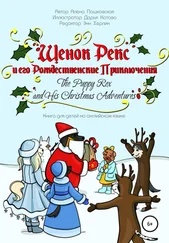Anna Bartlett Warner - Karl Krinken, His Christmas Stocking
Здесь есть возможность читать онлайн «Anna Bartlett Warner - Karl Krinken, His Christmas Stocking» — ознакомительный отрывок электронной книги совершенно бесплатно, а после прочтения отрывка купить полную версию. В некоторых случаях можно слушать аудио, скачать через торрент в формате fb2 и присутствует краткое содержание. Жанр: foreign_children, foreign_antique, foreign_prose, на английском языке. Описание произведения, (предисловие) а так же отзывы посетителей доступны на портале библиотеки ЛибКат.
- Название:Karl Krinken, His Christmas Stocking
- Автор:
- Жанр:
- Год:неизвестен
- ISBN:нет данных
- Рейтинг книги:3 / 5. Голосов: 1
-
Избранное:Добавить в избранное
- Отзывы:
-
Ваша оценка:
- 60
- 1
- 2
- 3
- 4
- 5
Karl Krinken, His Christmas Stocking: краткое содержание, описание и аннотация
Предлагаем к чтению аннотацию, описание, краткое содержание или предисловие (зависит от того, что написал сам автор книги «Karl Krinken, His Christmas Stocking»). Если вы не нашли необходимую информацию о книге — напишите в комментариях, мы постараемся отыскать её.
Karl Krinken, His Christmas Stocking — читать онлайн ознакомительный отрывок
Ниже представлен текст книги, разбитый по страницам. Система сохранения места последней прочитанной страницы, позволяет с удобством читать онлайн бесплатно книгу «Karl Krinken, His Christmas Stocking», без необходимости каждый раз заново искать на чём Вы остановились. Поставьте закладку, и сможете в любой момент перейти на страницу, на которой закончили чтение.
Интервал:
Закладка:
“‘But only look at it, grandpa,’ said the child; ’see—it’s only a red cent. I’m sure he didn’t change it.’
“‘I don’t want to look at it,’ said he putting away her hand. ‘All stuff, my dear—it was as good an eagle as ever came out of the Mint. Don’t I know the feel of one? and didn’t I take it out of the gold end of my purse, where I never put copper? Bad boy, no doubt—you mustn’t go back to him. Here, William—’
“‘But he looked good, grandpa,’ said the child, ’and so sorry.’
“‘He’ll look sorry now, I’ll be bound,’ said the old man. ‘I say, William!—take this red cent back to that boy, and tell him to be off with it, and not to show his face here again.’
“The command was strictly obeyed; and my new owner after a vain attempt to move the waiter, carried me into the street and sat down on the next door-step. Never in my life have I felt so grieved at being only a red cent, as then.
“The boy turned me over and over, and looked at me and read my date with a bewildered air, as if he did not know what he was doing; and I alas, who could have testified to his honesty, had no voice to speak.
“At length he seemed to comprehend his loss; for dropping me on the pavement he sank his head on his hands, and the hot tears fell fast down from his face upon mine. Then, in a sudden passion of grief and excitement he caught me up and threw me from him as far as he could; and I, who had been too proud to associate with red cents, now fell to the very bottom of an inglorious heap of mud. As I lay there half smothered, I could hear the steps of the boy, who soon repenting of his rashness now sought me—inasmuch as I was better than nothing; but he sought in vain. He couldn’t see me and I couldn’t see him, especially as there was little but lamplight to see by, and he presently walked away.
“I am not good at reckoning time,” said the red cent, “but I should think I might have lain there about a week—the mud heap having in the mean time changed to one of dust; when a furious shower arose one afternoon, or I should rather say came down; and not only were dust and mud swept away, but the rain even washed my face for me, and left me almost as bright as ever high and dry upon a clean paving-stone.
“I felt so pleased and refreshed with being able to look about once more, that what next would become of me hardly cost a thought; and very wet and shiny I lay there, basking in the late sunshine.”
“I thought you said you were high and dry?” said Carl.
“That is a phrase which we use,” replied the red cent. “I was high and dry in one sense,—quite lifted above the little streams of water that gurgled about among the paving-stones, though the rain-drops were not wiped off my face; and as I lay there I suddenly felt myself picked up by a most careful little finger and thumb, which had no desire to get wet or muddy. They belonged to a little girl about ten years old.
“‘You pretty red cent!’ she said, admiringly,—‘how bright and nice you do look! and how funny it is that I should find you—I never found anything before. I wonder how you came here—I hope some poor child didn’t lose you.’
“While she thus expressed her opinion I was busy making up mine, and truly it was a pleasant one. Her calico frock was of an indescribable brown, formed by the fading together of all the bright colours that had once enlivened it,—water and soap and long wear had done this. But water and soap had also kept it clean, and a very little starch spread it out into some shape, and displayed the peculiar brown to the best advantage. Instead of an old straw bonnet with soiled ribbons she had a neat little sun-bonnet; but this was made of a piece of new pink calico, and made her face look quite rosy. I could not see her feet and pantalettes, for my back was towards them, but I have no doubt they were in nice order—she was too nice a child to have it otherwise. Her hair was brushed quite smooth, only when she stooped to pick me up one lock had fallen down from under the sun-bonnet; and her face was as simple and good as it could be. With what contented eyes did she look at me! She didn’t wish I was an eagle—indeed I thought it doubtful whether she had ever heard of such a thing. But I saw that her cheeks were thin, and that they might have been pale but for the pink sun-bonnet. Whatever she meant by ‘a poor child,’ little Nanny would surely have given the name to her.
“Suddenly she exclaimed,—
“‘Now I can get it!—O I’m so glad! Come little red cent, I must give you away, though I should like to keep you very much, for you’re very pretty; but you are all the money I’ve got in the world.’
“‘Now for the candy-store,’ thought I; for as she turned and began to walk away as fast as she could, I peeped into the little basket that hung on her arm and saw there a small loaf of bread—so I knew I was not to go for that commodity. She did not put me in the basket, but kept me fast in her hand as she tripped along, till we came to a large grocery. There she went in.
“‘Please sir to let me have a cent’s worth of tea?’ she said timidly.
“‘Got sixpence to pay for it?’ said one of the clerks to make the other clerks laugh, in which he succeeded.
“‘No sir, I’ve got this,’ she said, modestly showing me, and giving me a kind glance at the same time. ‘It’s only a cent, but it will get enough for mother, and she’s sick and wanted some tea so much.’
“The young men stopped laughing, and looked at the child as if she had just come out of the museum; and one of them taking down a canister measured out two or three good pinches of tea into a brown paper and folded it up. The child took it with a very glad face, laying me down on the counter with a joyful ‘Thank you, sir!’ which I by no means repeated—I wanted to go home with her and see that tea made. But we red cents can never know the good that our purchases do in the world.
“The clerk took me up and balanced me upon his finger, as if he had half a mind to give the child back her money, and pay the sum of one cent into the store out of his own private purse. But habit prevailed; and dropping me into the till I heard him remark as he closed it,—
“‘I say, Bill, I shouldn’t wonder now if that was a good child.’
“I shouldn’t have wondered, either.
“We were a dull company in the till that night, for most of the money was old; and it is a well-known fact that worn-down coins are not communicative. And some of the pieces were rusty through long keeping, and one disconsolate little sixpence which sat alone in the furthest corner of the till, was in a very sad state of mind; for he had just laid himself out to buy some rice for a poor family and now could do nothing more for them—and he was the last monied friend they had.
“In this inactive kind of life some time passed away, and though some of us were occasionally taken to market yet we never bought anything. But one evening a man came into the grocery and asked for starch, and we hoped for bright visiters; but I had no time to enjoy them, for I was sent to make change. The messenger was a manservant, and with the starch in his hand and me in his pocket he soon left the store and went whistling along the street. Then he put his other hand into the pocket and jingled me against the rest of the change in a most unpleasant manner—picking me up and dropping me again just as if red cents had no feeling. I was glad when he reached home, and ran down the area steps and into the kitchen. He gave the starch to the cook, and then marking down on a little bit of paper what he had bought and what he had spent, he carried it with the change into the parlour. But what was my surprise to find that I was in the very same house whence I had gone forth as a golden eagle!
Читать дальшеИнтервал:
Закладка:
Похожие книги на «Karl Krinken, His Christmas Stocking»
Представляем Вашему вниманию похожие книги на «Karl Krinken, His Christmas Stocking» списком для выбора. Мы отобрали схожую по названию и смыслу литературу в надежде предоставить читателям больше вариантов отыскать новые, интересные, ещё непрочитанные произведения.
Обсуждение, отзывы о книге «Karl Krinken, His Christmas Stocking» и просто собственные мнения читателей. Оставьте ваши комментарии, напишите, что Вы думаете о произведении, его смысле или главных героях. Укажите что конкретно понравилось, а что нет, и почему Вы так считаете.












